Poetry and culture in the bygone years of Japan through the prism of Buddhism
Lee Jay Walker
Modern Tokyo Times

The elite nature of Japanese Buddhism began to change dramatically during the Kamakura Period (1185-1333) because many famous Buddhist leaders in this period would take faith to all and sundry. Officially, the new era of the Kamakura Period began in 1192 under the tutelage of Minamoto no Yoritomo – the first shogun. However, the world of the famous Buddhist monk Jien belongs to the corridors of power despite the changing times.
Hence, the world of Jien belongs to momentous changes for Japanese Buddhism because many new sects with famous leaders would emerge. For example, Nichiren and Honen (born before this period but died during the Kamakura Period) belong to the same period of history. On top of this, Jien belongs to the world of feudalism in Japan and the vigor of the warrior caste (the samurai) that altered the old dynamics.
In another post, I state, “Jien was a Buddhist holy man who belonged to the Tendai sect of Buddhism. This classical school of Buddhism is instrumental in Japan because of internal mechanisms and the legacy of important non-Tendai Japanese Buddhist holy leaders. For example, the holy Buddhist priests of Dogen, Honen, Nichiren, and Shinran became famous outside of Tendai Buddhism. Yet, initially, all these famous Buddhist preachers were trained as Tendai Buddhist monks.”

The Lotus Sutra was instrumental for Jien because this guidance and wisdom enabled salvation and enlightenment, according to this noble Buddhist monk. Equally, the power of Tendai Buddhism in absorbing the traits of Japanese aesthetics and Shintoism also shaped his worldview. This can be felt in his writings and poems – and sometimes this applies to senses of foreboding in some of his poems. Also, Jien acknowledged the necessity of the Shogun and the feudal times that ensued during the Kamakura Period.
In one poem, he writes adorably:
Unfit, yet
The common folk of this cruel world
Would I cover,
Standing in this timber-grove
With sleeves stained black.

Overall, despite so many Buddhist leading figures being born in this period of Japanese history, Jien felt a sense of foreboding. In his view, just like the contemporary Tibetan Dalai Lama, he believed that civilization was in decline. Naturally, following on from this, Jien believed the religious order of Japan was spiritually suffering – a point of view that is held in many modern nations, from Japan to the United Kingdom.
Jien composed a historical masterpiece titled the Gukansho. Of course, this work will provide a view that is favorable to the Fujiwara clan about power concentration. However, despite this, you can feel the rich principles of history through the thought patterns of Tendai Buddhism. This in itself is richness beyond words.
Hence, Jien wrote pointedly:
Though I search
Every field
Overlooking nothing,
All the flowers are but
The flower of the law

Modern Tokyo News is part of the Modern Tokyo Times group
DONATIONS to SUPPORT MODERN TOKYO TIMES – please pay PayPal and DONATE to sawakoart@gmail.com
http://moderntokyotimes.com Modern Tokyo Times – International News and Japan News
http://sawakoart.com – Sawako Utsumi personal website and Modern Tokyo Times artist
https://moderntokyonews.com Modern Tokyo News – Tokyo News and International News
http://global-security-news.com Global Security News – Geopolitics and Terrorism
PLEASE JOIN ON TWITTER
https://twitter.com/MTT_News Modern Tokyo Times
PLEASE JOIN ON FACEBOOK